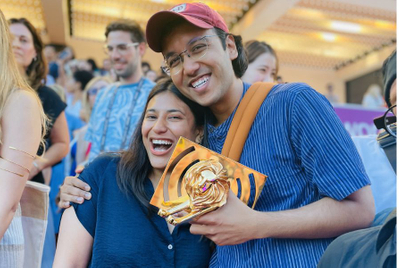
This weekend, an incredible summer of sport kicks off with England launching its UEFA Euros campaign against Serbia. Simultaneously, the Cannes Lions jury will gather to judge the Entertainment Lions for Sport.
It's the fourth year of the festival taking sport seriously, a significant shift from the inaugural sports category jury in 2021, which convened on Zoom amid a global pandemic. Back then, the entries were deeply moving and reflective of the time but were limited mainly to men's football and had little representation from Asia.
Three years on, the category has grown and evolved, gaining more attention from organisers and advertisers. Now the festival even boasts a sports-dedicated beach on the Croisette, rivalling those of the major tech players. So why the increased interest? And why should brands take note?
The opportunity
The sports industry has never been stronger. In an era of media fragmentation, sport remains an unparalleled live event, capable of reaching a massive, engaged audience. Last weekend’s UEFA Champions League Final between Real Madrid and Dortmund was estimated to have attracted a global audience of 145 million viewers. Earlier this year, 123.4 million viewers tuned in to watch the Kansas City Chiefs defeat the San Francisco 49ers at Super Bowl LVIII – making it the most-watched Super Bowl in history. The rise of women's sports has also contributed to increased viewership and attendance in 2024.
With more fans come more attention and investment. Broadcasters are willing to pay huge sums for sports rights, and brands are also investing heavily. NBC reportedly tabled a $2.5bn offer for NBA rights to challenge TNT, doubling what TNT Sports currently pays.
And now private equity firms are getting in on the act as they have also recognised the immense potential in the sports sector. In 2023 alone, private equity investments in sports totalled approximately $30bn, underscoring the lucrative opportunities and strong growth prospects in the industry.
Brands recognise the untapped potential in focusing on women’s sports. Nike's $28m deal with WNBA star Caitlin Clarke highlights the realisation that brands have ignored half the population's spending power by focusing solely on men's sports.
The sports dividend
Brands can capitalise on the thriving sports industry as a channel for growth. Our effectiveness study with System 1 revealed that sports marketing adds incremental value, known as “the sports dividend”.
We tested 170 sports marketing campaigns and gathered emotional data from more than 33,000 individuals across Germany, France, the UK and the US. The study showed that when sport is integrated into creative content, it elicits stronger feelings of happiness, a key emotion for brand success. Happiness supports the memory structure around a brand, making it more likely to be recalled when consumers are in the market to buy.
For instance, Vodafone's ad for Wimbledon last summer, featuring the story of a parent of a wheelchair tennis champion, not only scored well with general audiences but even better with sports fans, achieving a five-star rating in System 1's effectiveness testing. The ad powerfully showcased Vodafone’s product, associating the brand with positive emotions that will influence consumer choices in the future.
Similarly, the "No Walkers, no game" ad, featuring David Beckham and Thierry Henry ahead of the UEFA Champions League Final, scored five stars. The ad used celebrity power IP at a time of peak football excitement, humour and a simple idea, demonstrating how sport can create highly effective advertising. According to the effectiveness scale, System 1 says this ad has scored the second best ever rating for a mass audience (not just sports fans).
Connecting brands to culture
Sports help brands connect to hard-to-reach audiences by linking them to culture. Brands with cultural relevance grow six times faster than those without. Sports enables brands to quickly penetrate various genres and broader culture. A great example is Stormzy and Adidas's Merky FC HQ in south London, which provides young people with opportunities in football and other creative fields, such as music and content creation.
Sports can also serve as a gateway to broader cultural engagement, attracting new sponsors from the luxury sector. LVMH has moved from niche to mainstream sports, such as the NBA and the Paris 2024 Olympics. Gucci recently partnered soccer player Jack Grealish to welcome him to Gucci Town in Roblox, blending sports with luxury and virtual engagement.
The increasing interest in sports at Cannes Lions and beyond signals a significant shift in how brands approach sports marketing. With the industry's growth estimated to surge by 60% over the next decade to $260bn (according to Two Circles), while sport may be fun to play and watch, it is extremely serious when it comes to potential brand growth.
Louise Johnson is the Entertainment Lions for Sport jury president and Fuse chief executive



.jpg&h=334&w=500&q=100&v=20250320&c=1)
.jpg&h=334&w=500&q=100&v=20250320&c=1)
.jpg&h=334&w=500&q=100&v=20250320&c=1)




.png&h=334&w=500&q=100&v=20250320&c=1)








.png&h=268&w=401&q=100&v=20250320&c=1)
